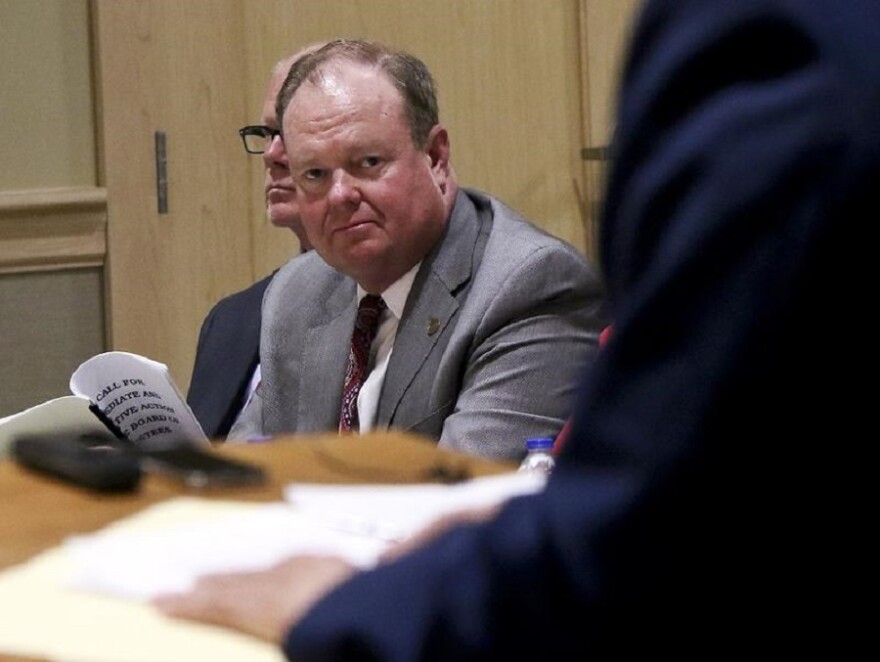GARDEN CITY, Kansas — The Garden City Community College finalized a settlement this week in a lawsuit that accused the school’s administration of muzzling the ability of its workers to talk with the media and a range of other issues.
In a special meeting on Wednesday, the school’s trustees agreed to pay $87,500 to six plaintiffs in response to charges leveled at the college and its former president.
The suit alleged former GCCC President Herbert Swender and the college violated a range of constitutional rights by threatening faculty and staff if they spoke to reporters about the school, by searching cellphones for evidence, and by requiring prayer at meetings.
In a statement, the trustees acknowledged that the plaintiffs “felt their voices were not heard at the time when issues were raised about the management and operation of GCCC.”
They also acknowledged "the difficulty and courage it took for the litigants to step forward as well as the risk to personal and professional reputation each endured."
None of the plaintiffs responded to requests for comment, but Jean Lamfers, the plaintiffs’ attorney, said that acknowledgment — plus recent changes to school policy aimed at better protecting employee rights — satisfied her clients.
“It was never the money,” Lamfers said. “It was the acknowledgment, the vindication and the changes in policy that my clients were seeking.”
Swender’s contract was terminated in August 2018 based on concerns initially raised in a faculty senate report – some of which were identified in the lawsuit - presented to trustees in May 2018, which as previously reported by HPPR, accused Swender of bullying, intimidating and harassing students, employees and volunteers.
Lamfers said Swender is being dismissed from the lawsuit as part of the settlement.
In an email to HPPR Friday, GCCC spokesperson Shajia Ahmad said the college would not be making any further comments regarding the settlement agreement.
Much of the dispute centered on accreditation problems at the community college.
In July 2017, GCCC was placed on two-year accreditation probation by the Higher Learning Commission (HLC) because “it determined that the College did not meet HLC’s Criteria for Accreditation related to faculty and staffing needs, quality of education programs, assessment of student learning, and improvement in student retention and completion, institutional planning, and institutional performance.”
The lawsuit contended that Swender reprimanded faculty and staff for sharing remarks he made about the accreditation process with KSN, a Wichita television station, at an in-service meeting, including “his criticism of the HLC as biased and incompetent.”
After KSN contacted him about his remarks, Swender spoke with faculty and staff following a luncheon, at which point he ordered everyone in attendance to never speak to the media about college affairs without prior college approval, the lawsuit alleged. Swender also told them to swap cellphones to determine who had spoken with the media.
Those actions, the lawsuit alleged, violated First Amendment free speech rights, and the cell phone swap violated the Fourth Amendment, which prohibits illegal search and seizure.
According to Ahmad, the accreditation agency removed GCCC's sanction of probation in June 2019 and GCCC remained fully accredited throughout its probationary status.
The lawsuit also alleged that Swender imposed prayer at mandatory in-service meetings, violating the plaintiffs’ and other employees’ rights to freedom of religion.
Swender, at the beginning of his tenure at GCCC in 2011, regularly arranged for Protestant prayers and only Protestant prayers to be given at the in-service meetings, the suit said.
“The repeated Protestant prayers, the requirement to bow heads, the talk by Pastor (Ricky) Griffin, and the declaration of Pastor (Nathan) Sheridan as the College’s Pastor disturbed Plaintiffs and violated their constitutional rights,” the suit said. “They felt very uncomfortable that their employer, a public entity, was trying to establish Protestant Christianity as the College’s Religion.”
The plaintiffs, the lawsuit said, “were also concerned that if they showed any aversion or disagreement they would be retaliated against in the terms and conditions of their public employment.”
According to the college’s statement Wednesday, “GCCC has worked closely with faculty and staff and has implemented changes to some policies,” and has been working with employees to implement those changes.
According to the email from Ahmad, GCCC recently adopted a religious freedom policy after being approved and reviewed by College Council, comprised of staff and faculty leaders from across campus.
That policy states in part, “Members of the college community, including faculty, administrators, staff, and students shall have the civil right to the exercise of religion without any direct or indirect constraints, inhibition, curtailment, or denial of such exercise of religion.”
It also states that “no person authorized by or acting on behalf of the college, may compel any action contrary to a person’s exercise of religion, including, but not limited to, compelling prayer, withholding benefits, assessing penalties, or excluding any other person from programs or access to facilities of the college,” which also applies to any event convened or sponsored by the college, whether on or off campus.
In March 2019, the college adopted a policy called “Employee Involvement with the Media” that says only the director of public relations, the president and certain senior administrators can speak to external media outlets on behalf of the college.
“This policy is in no way an attempt to violate college employee’s rights to free speech, assemblage, or press,” the policy states. “However, if an individual employee chooses to speak with media groups, the individual should make it clear that they are speaking on their own behalf and do not speak for the college.”
It also states that employees will not be subject to “any form of retaliation for comments made to the media regarding matters of public interest to the college.”
Those and other GCCC policies can be found here.
* A previous version of this story incorrectly identified the college's attorney.







